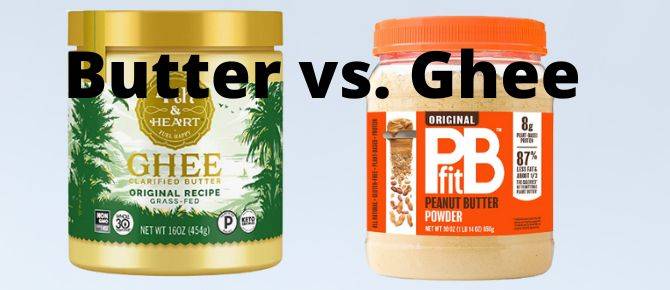Many people hear the word ‘ghee’ and run for the hills. Others shun butter because of its high cholesterol intake. So, what’s the right thing to do? Should we favor one over the other or just steer clear of both of them?
If you’re unsure about the butter vs. ghee debate, you’ve come to the right place. We’re here to put all your queries to bed and tell you which is the healthier option for you and your family.
Let’s get started.
Butter vs. Ghee Overview
Let’s start with one of the things these fatty substances have in common: a high smoking point. Ghee can reach temperatures as high as 485°F, whereas butter has a slightly lower smoking point of around 350°F.
To put things in perspective, seed and vegetable oils have a low smoking point of about 300°F to 320°F. When they reach higher temperatures, they begin to burn and turn black. They also start producing a toxic compound known as acrylamide.
Butter and ghee, however, are as much as 10 times less likely to produce this toxic compound. So, they’re less volatile and more stable when they reach extreme temperatures.
Now it’s time to find out how they’re made as well as a few common uses for each one.
Butter
Butter contains high amounts of milk proteins. As a result, it can go bad if left unrefrigerated for a long time, especially in the summer.
One tip you can try is to cut up the block of butter into smaller chunks. Then, wrap them up in wax paper or airtight bags.
You can store butter in the fridge for up to three months. In the freezer, it can last for over a year.
Types of Butter
There are many types of butter available on the market nowadays, including:
- Salted/unsalted
- High/low butterfat content
- Cultured/uncultured
Common Uses
Because butter has a creamier flavor, it’s often used in making stews and sauces, like white sauce.
Butter also works well in dishes that need low-to-medium temperatures. A couple of examples would be sauteed vegetables, shellfish, and baked goods.
Some people combine butter with herbs, garlic, and onion. This adds a mouth-watering glaze to lean meat and poultry.
If you like click here for pricing All-Natural Peanut Butter Powder
Ghee
Ghee is a more concentrated, or clarified, form of butter. It was made as an alternative to butter, which kept going bad when the weather was hot.
So, people come up with the idea to remove all the water and milk content from butter. What they came up with was something that could be kept at room temperature for a few weeks.
Ghee’s fat content was higher than butter. And much like coconut oil, it could even harden up when temperatures turn colder.
Click here to learn more about Heart Original Grass-Fed Ghee.
How to Make It
Heat some butter. As the butter boils, the liquid portion of the milk separates from the fat, and the solid parts of the milk flow downwards and settle on the bottom.
What you’re left with is ghee, which is the leftover fat that floats to the surface after you’ve boiled the butter. Once the ghee is cooled down and can be handled, it’s strained to remove bits of solids.
Finally, it’s then transferred to the container of your choice. Make sure the containers you choose can withstand the warm liquid, like glass or tin.
Should I Be Using Ghee Or Butter?
If all you care about is calories and fat, it doesn’t matter whether you use ghee or butter. They have nearly comparable nutritional characteristics. Taking the milk out of ghee, on the other hand, provides additional benefits, including the lack of lactose and a higher smoke point.
Ghee vs. Butter Which Is Healthier?
Ghee contains slightly more fat and calories than butter. One tablespoon of ghee contains roughly 120 calories, whereas one tablespoon of butter contains about 102 calories. The difference in fat content varies depending on the food you produce, but ghee normally has a bit more.
Common Uses
Ghee is better used for cooking meat and other dishes that require high temperatures. This is because it has a high smoking point, allowing it to easily handle extreme temperatures.
Besides cooking, ghee is also used in Ayurveda. For thousands of years, this all-natural healing method has relied on ghee to treat and prevent inflammations.
Here’s an interesting nugget of information: ‘ghee’ is Sanskrit for ‘sprinkled.’ It got its name from the way the surface layer looks once it hardens.
Butter vs. Ghee: Nutritional Value
Both butter and ghee have high levels of saturated fatty acids. This means they’re calorie-dense foods.
According to the American Heart Association, only 5% to 6% of our daily calories should come from saturated fats. That comes to about 13 to 20 grams a day.
Several years back, medical experts warned against consuming any amount of saturated fats. They were linked to heart disease and obesity.
These facts still ring true today if consumed in large amounts. Yet, the conversation now is that these fats can be good for us, as long as they’re used in moderation.
We took one tablespoon—about 14 grams—of each and compared their nutritional value to help you decide which is better for your health. Let’s take a look.
Butter
Butter is often the go-to choice when cooking and baking at lower temperatures. Its creamier, sweeter flavor makes it the more suitable option.
Here’s the nutritional data for one tablespoon of butter:
- Calories: 100
- Fat: 11 grams
- Saturated fat: 7 grams
- Monounsaturated fat: 3 grams
- Polyunsaturated fat: 0.6 grams
- Vitamin A: 11% of the recommended daily amount (RDA)
Ghee
Ghee has more calories and a higher concentration of fat compared with butter. This means it contains more short-chain fatty acids. They work to get rid of toxins and improve gut health.
In addition, ghee is higher in a polyunsaturated fat called conjugated linoleic acid (CLA). Scientists believe it plays a role in boosting the immune system and reducing fat deposits.
Ghee contains fewer milk proteins than butter. It also has less sugar and lactose. This makes it a more suitable choice for anyone who is allergic to dairy ingredients.
Here’s the nutritional data for one tablespoon of ghee:
- Calories: 123
- Fat: 14 grams
- Saturated fat: 9 grams
- Monounsaturated fat: 4 grams
- Polyunsaturated fat: 0.6 grams
- Vitamin A: 13% of the recommended daily amount (RDA)
The Verdict
So, what’s the final word on the butter vs. ghee dispute? Which is healthier and better for our health?
Butter has a less fat content and fewer calories, but not by much. Nevertheless, it gives baked goods a sweet, delicious taste.
On the other hand, ghee may have an advantage because it helps prevent certain types of cancer. It also helps boost gut health.
After comparing their pros and cons, we concluded that one isn’t better than the other. They each contain elements that help improve our health. The key is to use them in moderation and practice portion control.
- 23 Must Try Outdoor Fire Pit Setups for Cozy Nights - July 5, 2025
- 24 Modern Fire Pit Ideas to Elevate Your Backyard Style - July 5, 2025
- 15 Unique DIY Fire Pit Ideas That Instantly Upgrade Your Backyard - July 4, 2025



